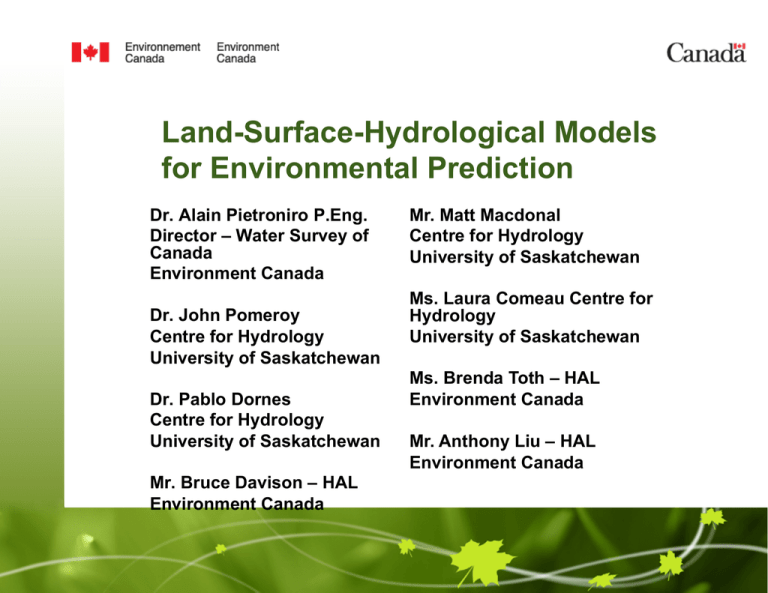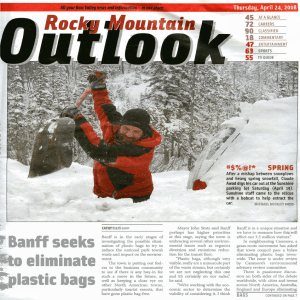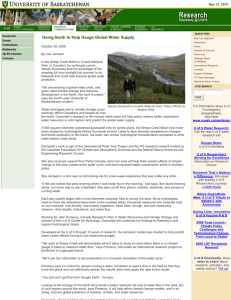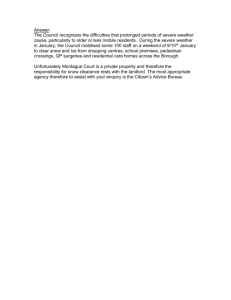Land-Surface-Hydrological Models for Environmental Prediction
advertisement

Land-Surface-Hydrological Models for Environmental Prediction Dr. Alain Pietroniro P.Eng. Director – Water Survey of Canada Environment Canada Dr. John Pomeroy Centre for Hydrology University of Saskatchewan Dr. Pablo Dornes Centre for Hydrology University of Saskatchewan Mr. Bruce Davison – HAL Environment Canada Mr. Matt Macdonal Centre for Hydrology University of Saskatchewan Ms. Laura Comeau Centre for Hydrology University of Saskatchewan Ms. Brenda Toth – HAL Environment Canada Mr. Anthony Liu – HAL Environment Canada Environmental Prediction Framework Upper air observations GEM atmospheric model 4DVar data assimilation CaPA: Canadian precipitation analysis Surface observations CaLDAS: Canadian land data assimilation “ On - line” mode “ Off - line” mode Surface scheme (CLASS or ISBA) and routing model MESH Modélisation environnementale communautaire (MEC) de la surface et de l’hydrologie MESH: A MEC surface/hydrology configuration designed for regional hydrological modeling • The tile connector (1D, scalable) redistributes mass and energy between tiles in a grid cell Tile connector – e.g. snow drift • The grid connector (2D) is responsible for routing runoff – can still be parallelized by grouping grid cells by subwatershed Grid connector Modelling methodology Inductive Approach basin segmentation Landscape based Topography – vegetation • Snow accumulation regimes • Blowing snow transport • Snowmelt energectics • Snow interception • Runoff generation/response Deductive Approach process descriptions Detail process understanding In cold regions research basins (e.g. WC, TVC, prairies) Vertical Flux Modeling Group 1. Single-column tests of CLASS, using either RUNCLASS (which does not include interflow) or stand-alone MESH (for testing CLASS on a slope). Vincent Fortin and Ric Soulis. 2. Modelling vegetation (shrub) interactions with snow and including new parameterisations in CLASS. Paul Bartlett, students of John Pomeroy, students of Richard Essery. 3. Radiation on complex topography (elevation, slope, aspect, vegetation), incorporation into MESH and CLASS. Diana Verseghy, Al Pietroniro. 4. Conversion of explicit time stepping scheme (up to 1 hour) for snow and soil layer (as thin as 1 cm) temperatures to a higher-order explicit scheme, and incorporation into CLASS. Bruce Davison, Diana Verseghy. 5. Empirical lake evaporation parameterisation. Anthony Liu, Vincent Fortin, Raoul Granger. (Long-term: Inclusion of full physically-based lake model in CLASS – Murray Mackay) 6. Basin discretization – not clear, as basins are all so different. Recommendation is for sensitivity testing, to determine relative effect of different discretization strategies. Individual basin groups. Tile Sequencing Group 1. Inclusion of spatial variability of energy fluxes and snow into MESH. Chris Marsh. 2. Need different tile connectors for different processes – need to be able to transfer surface flow, interflow, groundwater flow, snow. Should connectors be two-way? Matt MacDonald. 3. Debug the model – new version, rename shed file. Chris Marsh working on CLASS/MESH. Diana will provide comments on review. 4. Make parameters transferable – set up GRU library. Elevation differences between GRUs determine flow between GRUs. Set up a separate drainage GRU layer. Brenda Toth, Bruce Davison, HAL lab (custodian). 5. Grid connector: Split basin into smaller grids, set threshold flow for water to leave grid. Be able to transfer water without using the stream channel (use drainage area and set a flag for each square to determine if grid has a channel), using probability (grid <10 km) or surrogate river systems (grid >10 km). Frank Seglenieks. Snow Modelling 1. Shortwave and longwave radiation distribution for each tile according to slope and aspect – consider direct/diffuse, sky view factor, elevation/temperature. Incorporate into CLASS, MESH. Each basin lead to calculate distribution of slope and aspect for their basin, to be imported into EnSim – EnSim could be improved to do this calculation itself if this information results in improved modelling. Al Pietroniro (EnSim), John Pomeroy, Matt MacDonald/Chris Marsh. 2. Basin discretization by distribution of input data by elevation: This would allow elevation dependent GRU temperatures/water vapour and accommodate snow/rain line, but may be difficult in complex topography if grid size nears 1 km. Al Pietroniro, John Pomeroy, Matt MacDonald/Chris Marsh. 3. Distribution of wind speed across grid – need generic distribution function, hard coded into MESH (eventually into EnSim), to avoid computational complexity and large input data. Some code may already be available in CRHM. Matt MacDonald, student of Bryan Tolson. 4. Blowing snow incorporated into MESH, considering slopes, GRU segmentation, for Prairies/Arctic and mountains. Matt MacDonald. 5. Snow loading – improved approach for CLASS. Jimmy MacDonald, John Pomeroy, Paul Bartlett. 6. Radiation transfer through forest in CLASS, considering slope/aspect in addition to LAI. Chad Ellis, John Pomeroy, Diana Verseghy. 7. Post-IP3 (long term): Shrub loading/unloading and radiation influence on snow into CLASS. Richard Essery. Distribution of snow in highly-sloped environments, avalanches. John Pomeroy. HAL/U of S Research • Dornes (Ph.D- Complete) - Pomeroy – Successfully modeled stream flow and SWE during melt period – Successful transfer of parameterization • Comeau (MASc – Complete) – Large scale modelling of NSRB and SSRB using WATFLOOD – Estimates of Glacier contribution to flow – Preparation fro MESH testing in glaciated basins • MacDonald (MASc – in progress) - Pomeroy – PBSN coded into CLASS/MESH – Testing and evaluation in WOllf and Marmot Creek • Marsh (MASc – in progress) – Pomeroy, Spitteri – Summer project on code optimization MESH Code optimization (Marsh) • Over 50% of run time is spent in – – – – Main FLXSURFZ CLASS-S (Scatter) CLASS-G (Gather) • CLASS-S was removed and dependent functions were rewritten to use 1D vectors • 37 % reduction in CPU time Parallelization(Marsh) • Most loops in MESH • • • • and CLASS are iteration independent. Ideal candidates for parallelization. Implemented via OpenMP. With optimized code and 2-threads, a 47% speed increase was achieved (comparison with old code) 4 thread vs 2 thread 8-10 % increase MESH – Model Testing Grid model spa-al discre-sa-on 3 km x 3 km Landscape representa-on topography + land-­‐cover Snow-cover ablation – CLASS - Dornes Wolf Creek- discharges (calib.) Model Regionalisation TVC - SCA Model Regionalisation TVC - streamflow PBSM Class (MacDonald) • Testing on 2 basin • Full season simulations for Wolf Creek (adapted from Dornes) • MESH model domain established for Marmot • PBSM tested in CRHM • PBSM coded in MESH/CLASS – Optimization using DDS – Inter-tile transfer Marmot Creek Simulations 2006/2007 2007/2008 2008/2009 Observed CLASS CLASS-­‐PBSM Marmot Creek Simulations Wolf Creek (Granger) Simulations Publications • Comeau, L., A. Pietroniro, M. Demuth, “Glacier Contribution to the North and South • • • • Saskatchewan Rivers”, Hydrological Processes, CGU Special Edition Dornes, P.F., J.W. Pomeroy, A. Pietroniro, S.K. Carey and W.L. Quinton, 2008. “Influence of Landscape Aggregation in Modelling Snow-cover Ablation and Snowmelt Runoff in a Subarctic Mountainous Environment”, Hydrological Science Journal Dornes, P.F., J.W. Pomeroy, A. Pietroniro, and D.L. Verseghy, 2008. “Effects of Spatial Aggregation of Initial Conditions and Forcing Data on Modelling Snowmelt Using a Land Surface Scheme”, Journal of Hydrometeorology Demuth, M.N., V. Pinard, A. Pietroniro, B.H. Luckman, C. Hopkinson, P. Dornes and L. Comeau, 2008. “Recent and Past-century Variations in the Glacier Resources of the Canadian Rocky Mountains – Nelson River System. Terra Glacialis, Vol 11, No 248, 27-52. Dornes, P.F., B. Tolson, B. Davison, A. Pietroniro and J.W. Pomeroy, 2008. “Regionalisation of Land Surface Hydrological Model Parameters in Subarctic and Arctic Environments”, Physics and Chemistry of the Earth. Special Issue: From Measurement and Calibration to Understanding and Predictions in Hydrological Modelling, doi:10.1016/j.pce.2008.07.007. Acknowledgments • Funding for the work provided by IP3 and IPY • In-kind support – HAL lab – Environment Canada • Data provided through many collaborative studies over the years – Specific thanks to Rick Janowicz for providing advice and data for this work. – Diana Verseghy and Paul Bartlet for advice on CLASS – Bryan Tolson for assistance with DDS – Nick Kouwen for WATFLOOD help – many other ……………………




